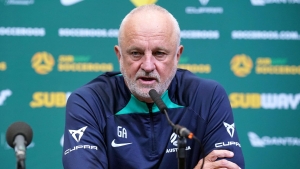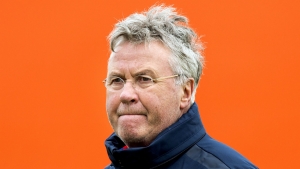Australia manager Graham Arnold reiterated Ange Postecoglou’s message for his side to beat England for “the kids and the nation” ahead of the first ever meeting between the countries at Wembley.
Arnold brought in Spurs boss Postecoglou and his fellow former Australia head coach Guus Hiddink in a bid to inspire the Socceroos ahead of Friday’s friendly in London.
Australia are underdogs going into the encounter, having only beaten England once in seven meetings – a 3-1 triumph at Upton Park in 2003 – and sitting 23 spots below their fourth-placed hosts in the FIFA world rankings, but Arnold says his side will only have victory on their minds when they take the pitch.
He said: “The speeches that Ange said yesterday were very similar about what we’ve been saying for years with doing it for the kids in Australia, the nation and your family and people who are close by and the supporters.
“I know one thing is that they (the players) will run until they drop, the energy will be there and they’ll put in the performance of their lives.
“I have got a special relationship with both (Postecoglou and Hiddink). I’ve known Ange for 40 odd years, I’ve played and coached against him, worked with him and we’ve had a great connection for years.
“With Guus, he’s pretty much a mentor to me and like a brother, a father. I’ve got to be careful with what I say because he’s not that old but he’s always been a great man to me and I worked with him during the 2006 World Cup as his assistant.
“We aim to win. We’re not going out there to lose or draw the game, we’re going out there to win the game.
“It’s the culture that we bring. We’ve seen the Socceroos and the Matildas (Australia women’s team) bring the nation together and this is not my team, it’s the nation’s team.”
While Australia are looking to make history at Wembley, Arnold highlighted some of the challenges he says they face trying to grow the game back home.
Despite the successful co-hosting of the Women’s World Cup this summer, where the Matildas got to the semi-finals, Arnold says the infrastructure and support they receive pales in comparison to other sports Down Under, or that England enjoy.
“We don’t get anywhere near the help and resources (of Australian rules football),” Arnold said.
“We see the Prime Minister and the government say they love coming out to watch the Socceroos and Matildas with scarves on but they must lose them when they go home.
“We don’t have a home of football. Whether you believe that or not, we don’t have a home.
“When the Socceroos come to Sydney to train, we have to go to a rugby league field where they remove the posts and put soccer posts up. That’s the truth.
“We are the highest participated sport at grassroots (in Australia). The last four days England have been at St George’s Park and they come down to (Wembley) where they are inspired and have a culture, we don’t have anything like that.
“After the World Cup I said ‘hopefully this will make things change’ and that government funding will help inspire the kid’s lives and fulfil their dreams.”
Australia’s most recent meeting with England saw the home side claim a 2-1 win at the Stadium of Light in 2016, when an 18-year-old Marcus Rashford because the youngest player to score on his England debut.
Roy Hodgson was in charge of England for that match but Arnold, who took charge in 2018, is looking forward to pitting his wits against the present incumbent Gareth Southgate.
Arnold said: “England are a fantastic team and Gareth Southgate is a great coach, a wonderful man and I look forward to seeing him tomorrow night.
“We are very appreciative of the invitation to play here and we’re looking forward to the match.”





























